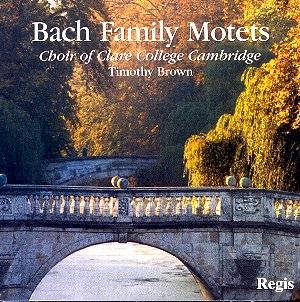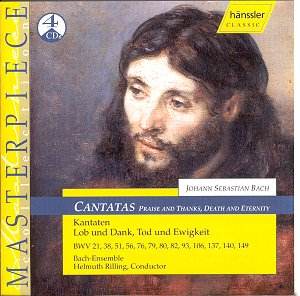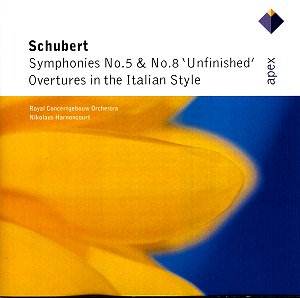 Composer: Johann Christian Bach (1642 – 1703), Johann Bach (1604 – 1673), Johann Michael Bach (1648 – 1694), Johann Christoph Bach (1605 – 1693), Johann Ludwig Bach (1677 – 1731)
Composer: Johann Christian Bach (1642 – 1703), Johann Bach (1604 – 1673), Johann Michael Bach (1648 – 1694), Johann Christoph Bach (1605 – 1693), Johann Ludwig Bach (1677 – 1731)
Works: 1. Lieber Herr Gott, 2. Unser Leben ist ein Schatten, 3. Herr, du lässest mich erfahren, 4. Nun hab’ ich überwunden, 5. Es ist nun aus, 6. Der Gerechte, ob er gleich, 7. Ich lasse dich nicht, 8. Fürchte dich nicht, 9. Sei lieber Tag willkommen, 10. Unserer Trübsal, 11. Das ist meine Freude
Performers: Choir of Clare College Cambridge/Timothy Brown, Liz Kenny (theorbo), Helen Gough (bass violin), Karl Dexter (organ)
Recording: St. Bartholomews, Orford, 1995
Label: REGIS RRC 1045
The Bach family represents an extraordinary lineage in the history of Western music, a dynasty that not only produced the towering figure of Johann Sebastian Bach but also numerous other composers whose works, while perhaps less known, are rich in historical and musical significance. This recording of Family Motets sheds light on the contributions of Johann Sebastian’s ancestors and contemporaries, offering a glimpse into the stylistic evolution that characterized the generations of Bachs. With works spanning from the early 17th century through the late 18th century, the collection encapsulates a variety of liturgical and secular influences that echo throughout the broader context of Baroque music.
Timothy Brown and the Clare College Choir deliver performances that are as illuminating as they are polished. The opening motet, Johann Christian Bach’s “Lieber Herr Gott,” exemplifies the delicate balance of harmonic texture and rhythmic vitality that characterizes the family’s output. Brown’s direction emphasizes clarity and precision, allowing the intricate counterpoint to unfold with an organic flow. The choir’s blend is notably cohesive, with a well-trained group of around twelve voices that manages to fill the sonic space with a richness that belies their size. This is especially evident in the piece “Unser Leben ist ein Schatten” by Johann Bach, where the ethereal interplay between the solo voices captures the ‘shadowy’ quality of the text through nuanced dynamics and phrasing.
The engineering of the recording merits commendation as well. The acoustic of St. Bartholomews provides a warm resonance that enriches the choral sound, allowing the subtleties of the theorbo and bass violin to emerge without overpowering the vocal lines. Liz Kenny’s theorbo playing, in particular, adds a gentle yet assertive underpinning that complements the singers beautifully. The sparse instrumentation is a deliberate choice, enhancing the transparency of the textures while allowing the vocal lines to shine by themselves.
Johann Michael Bach’s contributions, including “Herr, du lässest mich erfahren,” reveal a composer deeply attuned to the emotional weight of text setting. The chorale melody emerges with a sturdy grace, while the florid solo passages evoke the more elaborate writing of his illustrious relative, J.S. Bach. The interpretative choices made by Brown and the choir in this piece, especially the careful treatment of the chorale, resonate with an understanding of its liturgical significance while maintaining an expressive depth that invites listeners to ponder the spiritual implications of the music.
The dynamic contrasts found in Johann Ludwig Bach’s “Unserer Trübsal” and “Das ist meine Freude” further highlight the contrasts in vocal writing. The former begins with a haunting motif that is repeated with increasing intensity, while the latter showcases a buoyant energy. The choir’s adept handling of these contrasting moods illustrates their versatility and technical prowess. Each member’s ability to navigate the virtuosic demands of the text reflects a deep commitment to the music, enhancing the overall impact of the performance.
This recording serves not only as a fine introduction to the lesser-known Bach family members but also as a testament to the enduring legacy of the Bach tradition. The performances are imbued with a warmth and sincerity that makes them compelling and accessible, even to those unfamiliar with this repertoire. The artistry displayed by the Clare College Choir under Timothy Brown’s direction is commendable, and the recording quality allows for a full appreciation of the subtleties inherent in these motets. A significant addition to the catalog of early music, this album stands as a reminder of the rich tapestry of creativity within the Bach family, deserving of both scholarly attention and the appreciation of music lovers.



